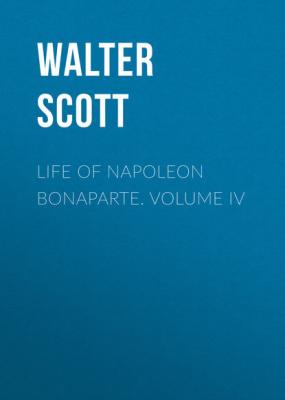Life of Napoleon Bonaparte. Volume IV. Вальтер Скотт
Читать онлайн.| Название | Life of Napoleon Bonaparte. Volume IV |
|---|---|
| Автор произведения | Вальтер Скотт |
| Жанр | |
| Серия | |
| Издательство | |
| Год выпуска | 0 |
| isbn |
78
Annual Register, vol. lii., p. 518.
79
Jests, as well as serious observations, were made on this occasion. "Have you any commands for France?" said a Frenchman at Naples to an English friend; "I shall be there in two days." – "In France?" answered his friend, "I thought you were setting off for Rome." – "True; but Rome, by a decree of the Emperor, is now indissolubly united to France." – "I have no news to burden you with," said his friend; "but can I do any thing for you in England? I shall be there in half an hour." – "In England?" said the Frenchman, "and in half an hour!" – "Yes," said his friend, "within that time I shall be at sea, and the sea has been indissolubly united to the British empire." – S.
80
See Mémoires de Savary, tom. iii., part i., p. 37.
81
Lucien landed at Portsmouth in December, 1810, and was conveyed to Ludlow, which he soon after quitted for an estate called Thorngrove, fifteen miles from that town. Restored to personal liberty by the peace of Paris in 1814, he reached Rome in May; and was received by the sovereign pontiff on the very night of his arrival. The holy father immediately conferred on him the dignity of a Roman prince; and on the next day all the nobles came to salute him, by the title of Prince of Canino.
82
Lucien's poem of "Charlemagne, ou l'Eglise Delivrée," an epic in twenty-four books, commenced at Tusculum, continued at Malta, and completed in England, appeared in 1814. It was translated into English by Dr. Butler and Mr. Hodgson. From the eighteenth canto, which was written at Malta, and which opens with a digression personal to the poet, we shall make a short extract: —
83
"He was discovered by his always drinking a bottle of the best wine, which so ill corresponded with his dress and apparent poverty, that it excited a suspicion amongst some of the spies, and he was arrested, searched, and his papers taken from him." – Napoleon,
84
See "Report concerning Kolli's Plan for liberating Ferdinand, King of Spain," Annual Register, vol. lii., p. 497.
85
Savary, tom. iii., part i., p. 53.
86
"The Emperor recalled Massena, who was quite exhausted by fatigue, and unable to bestow that attention to his troops which was necessary for restoring them to their former state of efficiency; and he selected for his successor in the command Marshal Marmont, the Governor of Illyria." – Savary, tom. iii., part i., p. 54.
87
Fouché, tom. ii., p. 71.
88
Fouché, tom. ii., p. 71.
89
Fouché, tom. ii., p. 80.
90
Mémoires de Fouché, tom. ii., p. 90.
91
Fouché afterwards remembered, that an individual in his neighbourhood, mayor of a municipality, and whom he himself had employed in matters of police, had one morning intruded rather hastily on him in his study, under pretext of pleading the cause of a distressed tenant; and concluded, that while he was searching for the papers concerning his visitor's ostensible business, Mr. Mayor had an opportunity to glance at the sheets on his scrutoire, where the repetition of V. M. I. and R. M. (intimating your Imperial and Royal Majesty,) betrayed that he was drawing up a memorial to Napoleon, and a word or two of the context explained its purport.
92
It is not unworthy of notice, that the Emperor's mother (Madame Mère, as she was termed) always expressed a presentiment, that the fortunes of her family, splendid as they were, would be altered before her death; and when ridiculed by her children for her frugal disposition, she used to allege she was saving money for them in their distress; and in fact she lived to apply her boards to that purpose. – S.
93
Meredith's Memorials of Charles John, King of Sweden and Norway, p. 25.
94
See Appendix to this Volume, No. I.
95
See Meredith's Memorials, p. 38.
96
In the
97
Histoire de l'Ambassade dans le Grand Duché de Varsovie en 1812.
98
The fact is now pretty generally admitted to have been as stated in the text. But in the public treaty, it appeared that France negotiated an armistice, called that of Slobodsea, by which it was stipulated, that the two disputed provinces of Moldavia and Wallachia were to be restored to the Turks. But the armistice, as had previously been settled between Napoleon and Alexander, broke up without any such restoration; and a congress, which was held at Jassy for the arrangement of the quarrel between the Porte and Court of St. Petersburgh, having been also dissolved without coming to an agreement, the war between the Turks and Russians recommenced upon the Danube. – S.
